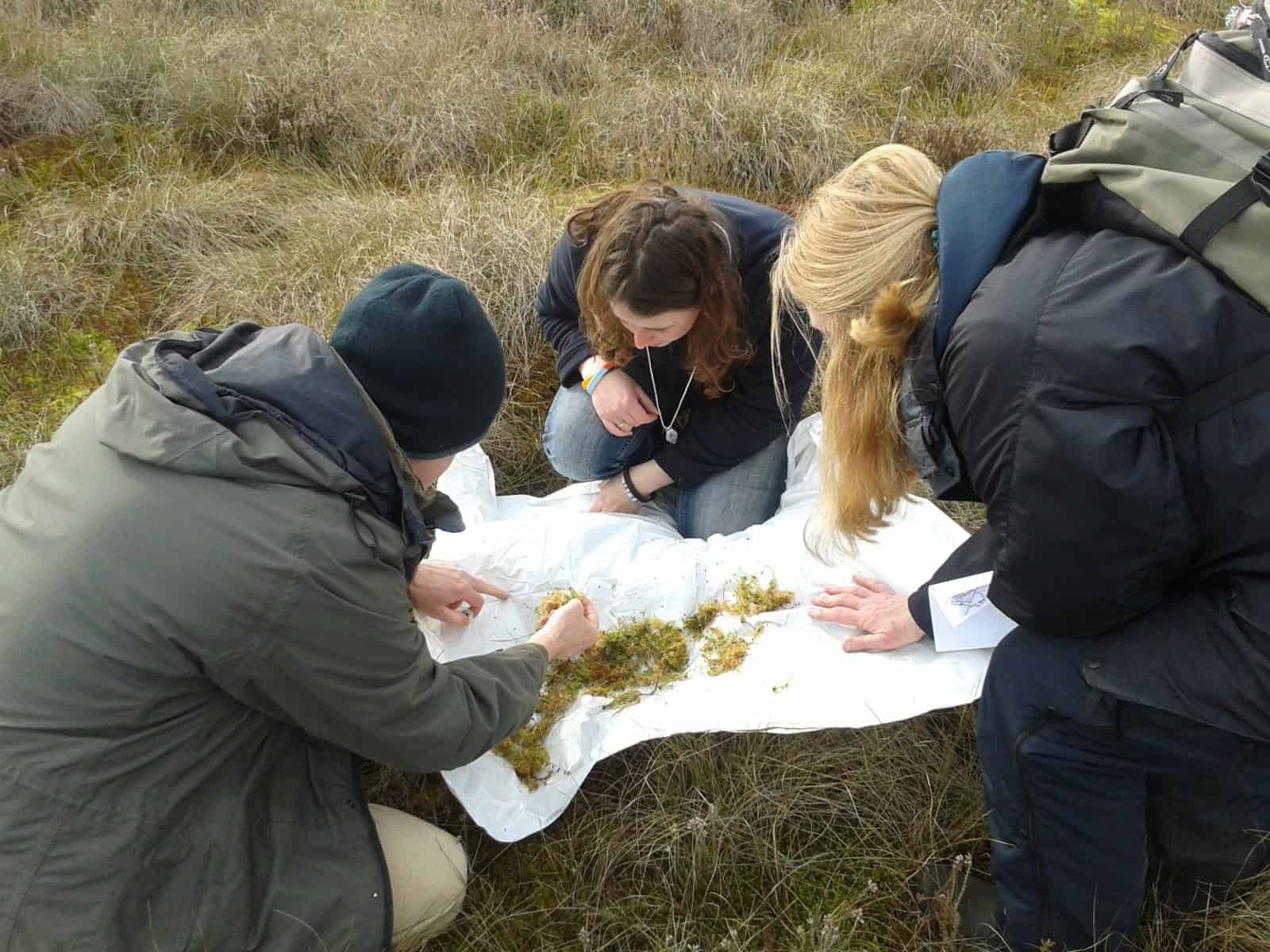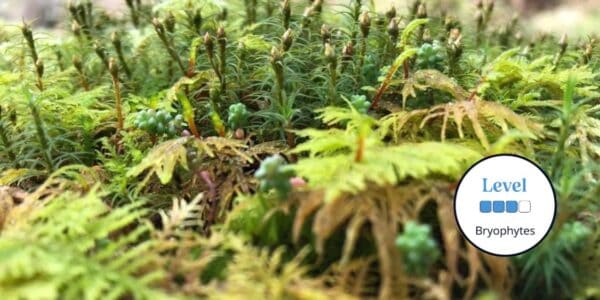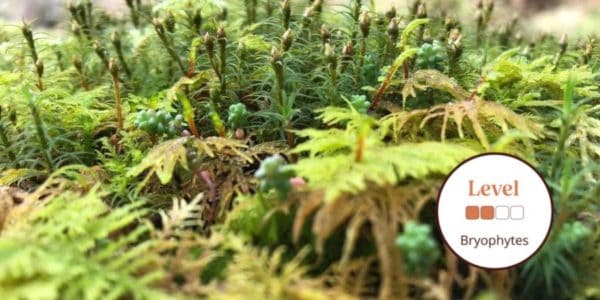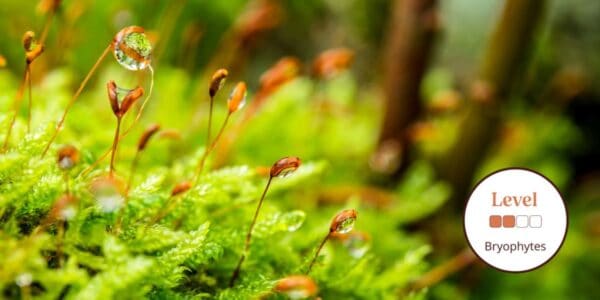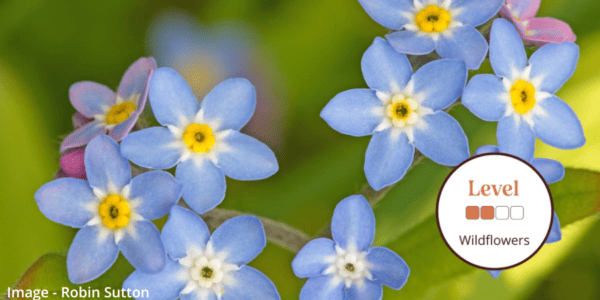This course is now fully booked.
To view similar courses, please visit our website here.
This beginner to intermediate course will consist of field excursions, during which we will see different Sphagnum moss species in situ and will learn to use keys to identify them.
Sphagna are ecosystem engineers which create wetland habitats of huge importance from a biodiversity, conservation, and carbon sequestration perspective. Correctly identifying Sphagnum to species is important not just for ecological consultants, but also for conservation professionals and volunteers.
Combining the use of field keys and laboratory skills, this course will allow attendees to get to know Sphagnum and make reliable identifications. The course will also have an indoor component during which the tutor will continue to guide attendees through the use of the key in group activities and individual work, as well as looking at diagnostic features with the use of a microscope. During the course, we will learn to use the key contained in the AIGAP publication ‘Sphagnum mosses: field key to the mosses of Britain and Ireland’ by M Godfrey and K Rogers. The key combines microscopic and field characters, making it suitable for use both in the field and in the lab.
The location of the course in the Snowdonia National Park, where the genus is very well-represented, will make it possible to see and become familiar with many common Sphagnum species as well as some of the more oceanic species.
The centre is set in the beautiful, rugged landscape of the Snowdonia National Park, North Wales – with access to secluded wooded valleys, rocky shores, beaches and traditional seaside resorts.
Please Note: There is no accommodation provided with this course. If you would like to book accommodation, lunch and an evening meal at FSC Rhyd-y-Creuau, please email [email protected]
Bookings will close if course capacity is reached
Who Should Attend?
Nature enthusiasts, Students, Early career ecologists, Citizen scientists, Volunteer surveyors, Land managers
Knowledge Level
Beginner. Level descriptors can be found on the following webpage: Framework and Course Level Descriptors
Prior Knowledge
An understanding of bryophyte features and terminology will make it easier and quicker for participants to learn to identify Sphagna.
What will be covered during this course?
-
- Introduce the genus Sphagnum
- Using field keys to identify Sphagnum
- Develop field identification skills
- Introduce and develop lab-based microscopic identification skills
By the end of the course, you will be able to:
-
- Have a good understanding of the characteristics of the genus Sphagnum
- Use the field key to identify common Sphagnum species
- Use a microscope to identify relevant microscopic features of different Sphagnum species
- Share this knowledge with friends, family, and fellow volunteers
The course gives you the opportunity to immerse yourself in a new subject and acquire novel skills. Our fantastic tutor will combine the use of classroom-led learning and outside learning opportunities to give individuals the skills and confidence to progress their learning.
-
- See the ‘Example Timetable’ and ‘What’s Included’ sections below for more information about this course.
- Upon booking you will need to provide individual details of all attendees
- Please email [email protected] if you have any questions.
Group Bookings Made Easy
If you have a group of 10 or more individuals wanting to complete one of our courses, our team are available to discuss your options – from discounts to private team courses.
-
- Discounted rates
- Privately run courses for your group
- Bespoke courses developed specifically for your needs
If we are unable to reach viable numbers for this course, we will inform you of the course cancellation 14 days prior to the course run. We would recommend when purchasing accommodation and/or travel you should take out your own insurance.
Tutor: Lucia Ruffino
Lucia Ruffino is a bryologist and free-lance botanical surveyor living and working in North Wales. Lucia’s botanical knowledge has developed over the years from an amateur background and she now specialises in NVC surveys in upland and peatland habitats.Book with Confidence
We understand the difficulties of making plans in the current situation when guidelines continue to change, and insurance conditions are being tightened. In response, we will continue to offer additional flexibility. Find out more here
Example Timetable
Example Timetable
This timetable is subject to change but should give a clear outline of what to expect
-
- Please arrive in time for the course to start promptly at 10:00am
- The course will end at 5:00pm
Day 1
| 10:00am | Introductions |
| 10:15am | Classroom session covering:
|
| 11:00am | Break and prepare for field session – refreshments not provided |
| 11:15am | Group activity: introduction to the AIDGAP key, its terminology, and main features.
This session will include using the key to identify specimens and working through the key together. |
| 12:00pm | Lunch – Not included |
| 2:00pm | Field excursion |
| 4:30pm | Classroom plenary and final questions |
| 5:00pm | End of day 1 |
Please note accommodation and an evening meal is not included
There will be an optional evening session (19.00 – 21.00) aimed at providing additional support to attendees with the use of microscopes and with further use of the key.
Day 2
| 10:00am | Recap of day 1 |
| 10:15am | Field excursion |
| 13:00pm | Lunch – Not included |
| 2:00pm | Individual learning session with tutor support: work through specimens collected during field excursions using the key and microscope. |
| 3:00pm | Break – refreshments not provided |
| 4:30pm | Classroom plenary and final questions |
| 5:00pm | End of course |
What's Included
The course has been carefully created by expert tutors and educators to help you continue to build and develop your knowledge and apply it within the field surrounded by like-minded individuals.
The course includes:
- Classroom learning covering the theory of the species
- Field excursions to apply new knowledge
- Expert tuition for which the Field Studies Council is renowned
- Clear objectives and progression
You can rest assured that the absolute best content from an expert in environmental education will be provided. In choosing a Field Studies Council course, you will be joining thousands of people who learn with us each year.
Before You Attend
Before you attend:
- Notebook and pencil
- Camera to capture images
- Please bring your own refreshments & pack lunch
- Sensible footwear and clothing for being outdoors
- Small polythene bags to collect Sphagnum in the field
- Recycled paper to use as storage for Sphagnum specimens
- The AIGAP publication ‘Sphagnum mosses: field key to the mosses of Britain and Ireland’ by M Godfrey and K Rogers
If you have them:
- Hand lens (x20 if possible)
- Dissecting and compound microscope
There will be a member of staff with first aid training and access to a first aid kit on site. If you have special medical or access requirements, please let us know as soon as possible so we can plan the course.
Sorry this course booking is closed

